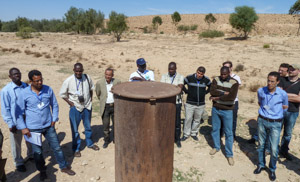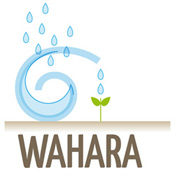WAHARA - Water Harvesting for Rainfed Africa
Introduction to the WAHARA project
In the variety of contexts in Africa – from arid to humid – the availability of water has become increasingly important, making an improved capture and usage of water essential. To ensure a continuous water supply for agricultural crops, water harvesting has been carried out in the earliest agricultural practices; however the environment has changed, as well as the number of people depending on it.
This is where the WAHARA project will make a difference: four countries, four pilot projects, one goal: increasing the potential of water harvesting.
Home
WAHARA project closed successfully
- Details
- Created on Monday, 07 November 2016 12:40
- Written by Erik van den Elsen
The WAHARA project has been officially closed as of February 29th 2016. This website will no longer be maintained, but will remain available in its current state.
The two main project aims have been written down in the project proposal:
- This project aims to study local water harvesting solutions, in order to innovate and develop appropriate water harvesting technologies that are replicable in the different geographical regions of rain fed Africa.
- The project aims to develop solutions applicable beyond local study sites and across the continent. In order to reach this objective, representative study sites are selected: Tunisia in the North, Burkina Faso in the West, Zambia in the South and Ethiopia in the East. Working with a trans-disciplinary perspective that takes into account not only biophysical aspects, but also socio-economic aspects and political conditions, the project will work closely together with various stakeholders, to make sure that selected solutions really meet their needs.
The people in the WAHARA project have been working on these two important aims for five years with great dedication. The project team from Europe (Netherlands, United Kingdom) and Africa (Ethiopia, Tunisia, Burkina Faso and Zambia) have been collaborating to establish the project aims. We think we have been successfull in achieving the project aims.
The project result has been laid down in the final publishable summary - document, that, together with the official deliverables and project reports have been approved by the European Commission.
An important quote from the executive summary:
WAHARA results overall indicate that water harvesting technologies not only work but have great potential. And, the expertise to actually do this is in principle available too. However, while the concept of WH, retaining runoff for productive use, is universal and simple, making it work is not. It requires adjusting to conditions that cannot be changed while making smart adjustments among those that can be. However, the bio-physical and socio-economic conditions are numerous, interconnected, often conflicting, and they differ widely between locations, even at short distance, as well as over time. Moreover, the real adaptation challenge is not to make a WH technology work under new conditions but to make it worthwhile; the expected benefits must be realised with limited resources, without taking a lot of time and for enough people. Introducing a new WH technology must demonstrate direct economic sense locally. Critical for sustained economic success are policy support, local ownership, local skills and inputs, access to adequate finance, profitable markets, private sector involvement and availability of services as well as professional farmers who can make the WH investments profitable. This explains why WH doesn’t spread easily; there can be no adoption without adaptation.
The WAHARA project team.

Part of the WAHARA project team on a field trip in Tunisia.













